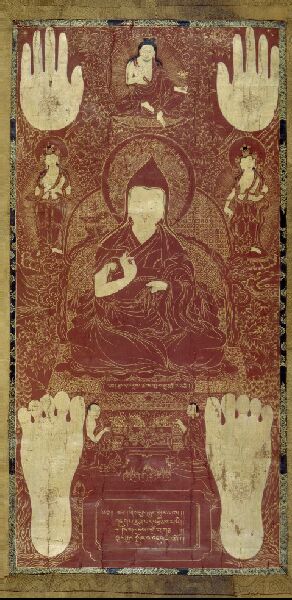Biography and autobiography in Tibet are important sources for both education and inspiration. The authors involved in the Treasury of Lives mine primary sources to provide English-language biographies of every known religious teacher from Tibet and the Himalaya, all of which are organized on their website. The following summarizes the biography of the 6th Dalai Lama, Tsangyang Gyatso, by Simon Wickham-Smith.
Poet Saints, Part 2: The 6th Dalai Lama
 In last week’s Treasury of Lives post, we told the story of Zhabkar Tsokdruk Rangdrol, an early 19th-century master whose autobiography is filled with beautiful poetic verse. This week we will explore another great poet saint of Tibetan tradition, the 6th Dalai Lama, Tsangyang Gyatso (1683–1706). Famous for his unconventional lifestyle, The 6th Dalai Lama was a poet and libertine fond of alcohol and of the brothels south of Potala Palace. His brief lyrics on the themes of love, the natural world, and spiritual life continue to be widely read.
In last week’s Treasury of Lives post, we told the story of Zhabkar Tsokdruk Rangdrol, an early 19th-century master whose autobiography is filled with beautiful poetic verse. This week we will explore another great poet saint of Tibetan tradition, the 6th Dalai Lama, Tsangyang Gyatso (1683–1706). Famous for his unconventional lifestyle, The 6th Dalai Lama was a poet and libertine fond of alcohol and of the brothels south of Potala Palace. His brief lyrics on the themes of love, the natural world, and spiritual life continue to be widely read.
The search for the reincarnation of the 5th Dalai Lama Ngawang Lobzang Gyatso (1617–1682) was conducted in total secrecy under the leadership of his regent Sanggye Gyatso (1653–1705), who concealed his teacher’s death for nearly 15 years, allegedly under his explicit orders. Six years after the death of the 5th, a 6th Dalai Lama was identified, but the young boy was kept away far from Lhasa until it became impossible for Sanggye Gyatso to continue to conceal the previous Dalai Lama’s death, almost ten years later. In 1697, the 6th was brought to Lhasa and enthroned, receiving his novice vows from the 5th Paṇchen Lama Lobzang Yeshe (1663–1737).
The political situation in Tibet at the turn of the 17th century was extremely delicate, with the Mongol Qoshud and the Manchu Qing vying for control of the region. The 5th Dalai Lama had only recently unified the political power of the Geluk tradition in Lhasa, where he had also begun the construction of the Potala, the focus of this power. The quixotic behavior of his reincarnation—clearly disinterested in politics and affiliated with the Nyingma as much as the Geluk—threatened the balance of power and the continuation of the Dalai Lama institution.
The Qoshud Mongols took control of Lhasa when, in 1705, their chief Lhazang Khan had the regent killed. The new Dalai Lama responded by refusing to accept full ordination from the Paṇchen Lama and insisting also on returning his novice vows. The religious hierarchy, however, reacted with horror to this decision. The Paṇchen Lama invited the young lama to Tashilhunpo, where he led a group of the Geluk hierarchy in petitioning Tsangyang Gyatso to rethink his stance.
Tsangyang Gyatso stood firm and when pressed, stated that were his decision to be rejected, he would commit suicide in front of Tashilhunpo. At this threat, the Paṇchen Lama backed down and accepted the return of the Dalai Lama’s vows, making Tsangyang Gyatso the first and only Dalai Lama to live as a layman.
In 1706 Lhazang Khan, the Mongol Qoshod ruler, placed Tsangyang Gyatso under arrest and presented his own son, Ngawang Yeshe Gyatso, as the true 6th Dalai Lama, whom he installed in the Potala. Tsangyang Gyatso was then “invited” to the Imperial Palace in Beijing. Despite protests by Tibetan monastics and laypeople, he was taken from his prison in Lhasa under guard to China.
From this moment, there are two alternative histories available to us, which are both offered as an explanation of why his body was never recovered and returned to the Potala. According to the first, Tsangyang Gyatso died at Kokonor, most likely from fever, on November 15, 1706. According to the second, which is related in his so-called “secret” or “hidden” biography written in 1756 by one of his students, Tsangyang Gyatso escaped from Kokonor and only died later, in 1746.
Three poems from the 6th Dalai Lama, Tsangyang Gyatso
I incline myself
To the teachings of my lama
But my heart secretly escapes
To the thoughts of my sweetheart
–
My sweetheart who truly loved me
Has been stolen to wed another.
I am sick with longing sorrow
And frustration emaciates my frail body
–
Longing for the landlord’s daughter
Blossoming in youthful beauty
Is like pining for peaches
Ripening on the high peach trees
Translations by K Dhondup.
Source: K Dhondup. “Some Poems of the Sixth Dalai Lama.”
Thank you for subscribing to Tricycle! As a nonprofit, we depend on readers like you to keep Buddhist teachings and practices widely available.